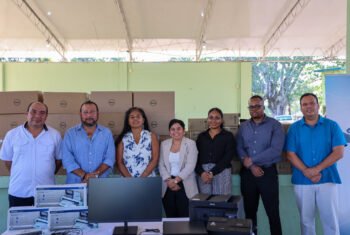Belmopan. January 28, 2022. The Ministry of Human Development, Families and Indigenous Peoples’ Affairs, along with the Commissioner of Indigenous Peoples’ Affairs, is pleased that Cabinet has approved the Maya of Southern Belize Free Prior Informed Consent Protocol (“FPIC”) filed with the Caribbean Court of Justice (CCJ) on 25 January 2022.
The Protocol affirms that Government, as well as third parties, must consult with the Mopan and Q’eqchi people prior to proceeding with initiatives or projects which may affect the Maya villages’ rights on their land, territory, and resources. This Protocol has been many years in the making, with multiple revisions resulting from numerous consultations with relevant parties.
When the Ministry of Human Development, Families and Indigenous Peoples’ Affairs was established and the Commissioner of Indigenous Peoples’ Affairs was appointed, the Ministry took the view that it is necessary to conduct a series of further inclusive and extensive consultations with all relevant organizations of the Maya Leaders Alliance, including the Toledo Alcaldes Association (TAA), the Toledo Maya Cultural Council (TMCC), the District Association of Village Councils (DAVCO), the Kekchi Council of Belize (KCB), the Toledo Maya Women’s Council (TMWC), the Julian Cho Society (JCS) and the Sarstoon Temash Institute for Indigenous Management (SATIIM). The consultations have taken the form of exchange of proposals on FPIC as well as face to face discussions which lasted from March to November of 2021. And Cabinet has considered the various revisions several times.
Government is committed to constructing new and beneficial relations of trust with the Maya Peoples. In pursuing this path, we have recognized and given prominence to the Alcaldes System of Governance of the Maya People. However, this has caused some misapprehension and need for clarification. To be clear, the Maya Leaders Alliance (MLA) and the TAA are membership organizations, but do not encompass the entire Maya customary governance system.
MLA leadership continues to claim that the TAA is the ‘collective governance institution of the Maya people.’ However, we do not believe that there is such ‘collective governance system’ of the Maya people. Customary governance is based at the village level, and as such, the authority to make decisions resides solely in meetings convened by village members, and not a collective or association. Furthermore, the FPIC recognizes this principle of Maya customary law: that village members at a village meeting, and not only the leaders, are the supreme decision-making authority.
Any claim of a lack of consultation on the part of Government is not so and therefore Government rejects that notion.
In submitting the FPIC Protocol to the Court (CCJ) after meetings with all the Maya organizations of the MLA, we have complied with the Court’s request that the FPIC be filed by the end of January 2022.
Minister Dolores Balderamos Garcia and Commissioner Gregory Ch’oc will further address the media shortly.
Ends



